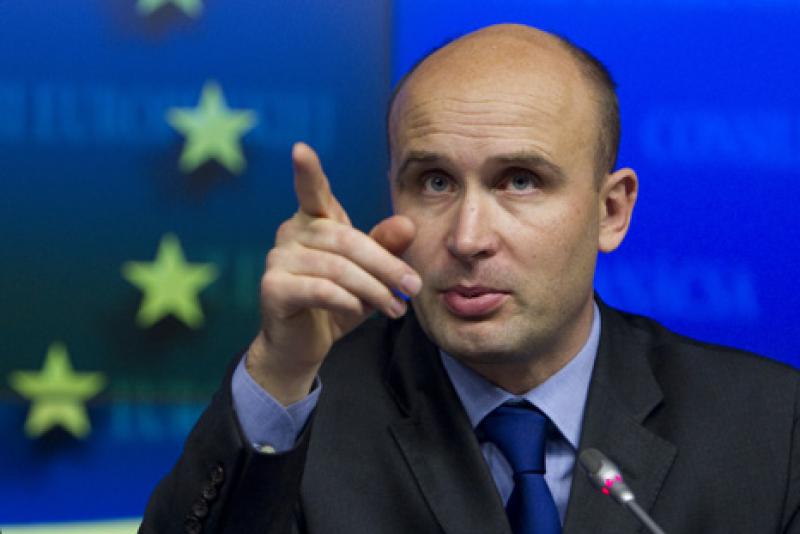
Dirty business in Warsaw
As the warm-up climate talks in Warsaw end, the message from the Polish government is clear: big companies get privileged access to negotiators, but NGOs are excluded.
Next month countries will gather in Warsaw for the latest round of climate negotiations but the exclusion of civil society, while business gets full access, has already begun at the warm-up talks, ending today (4th October 2013).
The UN climate talks, or COP19 (the 19th Conference of the Parties under the UN Framework Convention on Climate Change – UNFCCC), will be presided over by the Polish government, and in particular the Polish Minister for Environment, Marcin Korolec (see picture, right).
Minister Korolec has been at pains to emphasise that the UN climate talks this year in Poland will be business-friendly. At a press conference on 15th September he said:
“For the first time in 19 years, since the climate talks have been held, representatives of global business will be a part of it"
So what does this mean? Future blog posts will investigate exactly what role the Polish government sees for business, and why some of the dirtiest corporations like ArcelorMittal (steel giant with severe impacts in many communities around the world and the company which has pocketed more assets than anyone else in the EU carbon market (the emissions trading scheme)), BMW (active lobbyists against car CO2 emission reductions) and Lotos, (Polish oil company promoting shale gas exploration), are official COP19 partners.

But the evidence is already there: on Wednesday 2nd October a 3-day warm-up meeting began, the so-called pre-COP.
What exactly is it? The official Polish COP19 website lists it as the first of the official meetings, but offers no more details than that it will take place at the Hyatt hotel. What's being discussed? There's no agenda or press release, as if the public aren't supposed to find out.

Not surprising. The 3-day meeting brings together negotiators and ministers with several of the worst climate criminals, to see what kind of agreement they would be ready to support and what they expect from the negotiations; half of it will be dedicated explicitly to the role of business.
Co-hosted by the Polish ministry of environment and Lewiatan, the Polish branch of BusinessEurope (the most powerful business lobby in Brussels which excels in undermining climate legislation), the meeting has banned the presence of NGOs, in spite of some asking to be present.
The Polish government doesn't have a great track record when it comes to supporting its people against dirty industry: the recent battle between local farmers and US Oil giant Chevron, who wanted to 'frack' their land and has been licensed to do so by the ministry of environment, is a good example.
But the Pre-COP makes a mockery of environment minister Korolec when he said in September that:
“decisions must be determined jointly by the negotiators, politicians, NGOs and business"
According to one European NGO who asked a business attendee to help them get in, the Polish government said it was strictly business and politicians only.
So Polish corporations like Orlen (oil) and PGE (Poland's biggest energy company, particularly coal, shale gas and nuclear) have been invited, as well as others like chemical giant BASF, CEMEX, Alstom and General Electric, and of course groups like BusinessEurope.
But no civil society. No businesses working on real renewables. And no researchers. Only companies with a chilling track-record. Dirty energy, aggressive lobbying against progressive climate policies, promotion of carbon markets and other profitable false solutions. It's as if the latest science produced by the Intergovernmental Panel on Climate Change (IPCC), which shows how seriously current 'solutions' are failing, was never published.
The pre-cooking of negotiations with a gang of climate criminals does not make one optimistic about this COP. It's hard to beleive the lengths to which the Polish government is going. But this is not the only sign that the Polish government has decided to serve the COP on a silver platter to the big polluters; co-signing the coal industry's plea to the UN to embrace coal as a solution is another, and undoubtedly it won't be the last.
Unless this sellout is sufficiently challenged by a strong civil society voice, we risk not only the habitual lack of progress at UN climate talks, but a deeper seal of approval for increasing the burning of fossil fuels and a 'bluewash' for polluting companies. A clear message needs to be sent to the UN and the Polish government to reject industry's false solutions.
